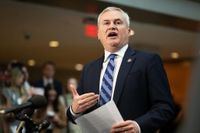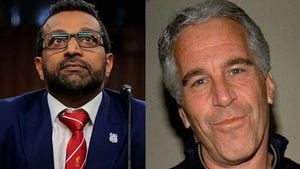Questions surrounding the relationship between former President Donald Trump and disgraced financier Jeffrey Epstein have resurfaced with renewed vigor, as Congress and the Justice Department find themselves in a standoff over the release of long-sought files. The saga, which has spanned decades and entangled some of the most powerful figures in American politics, continues to generate headlines and political headaches for the Trump administration in his second term.
It all began in the 1990s, when Trump, then a prominent real estate developer, and Epstein, a hedge-fund manager with a penchant for elite social circles, became friends. According to CBC, the two were frequently seen together at high-profile events in Manhattan and Palm Beach, Florida. In 1992, video footage captured them at a party at Trump’s Mar-a-Lago resort, mingling with guests. The following year, Epstein attended Trump’s wedding to Marla Maples, as confirmed by video and photos obtained by CNN.
Between 1993 and 1997, Trump traveled at least seven times on one of Epstein’s private jets, according to flight logs that would later become evidence in lawsuits. Importantly, none of these flights went to Epstein’s notorious private island in the Caribbean. In a 2002 feature for New York magazine, Trump described Epstein as “a terrific guy. He’s a lot of fun to be with. It’s even said that he likes beautiful women as much as I do, and many of them are on the younger side.”
Yet, the friendship would not last. By the mid-2000s, Trump and Epstein had a falling out, though the reasons remain murky. Trump has claimed the rift was triggered by Epstein “taking people that worked for me” at Mar-a-Lago, while other accounts point to a 2004 bidding war over a Palm Beach mansion or Epstein’s alleged harassment of a club member’s daughter. In 2003, Epstein received a leather-bound birthday book containing messages from friends, including one allegedly from Trump featuring an outline drawing of a naked woman and a cryptic note about a shared secret. Trump denies writing it and is currently suing the Wall Street Journal for libel over the story.
Epstein’s criminal activities came to light in 2008, when he pleaded guilty to state charges of soliciting prostitution from a minor. He avoided federal prosecution through a secret plea deal, a decision overseen by then-U.S. Attorney Alexander Acosta. Years later, in 2017, Trump nominated Acosta as Secretary of Labor—a move that would come back to haunt his administration when the Miami Herald exposed the plea deal in 2018. Acosta resigned in 2019 after federal prosecutors revived the criminal case against Epstein.
On July 8, 2019, Epstein was indicted on sex trafficking charges in Manhattan federal court and pleaded not guilty. Just a month later, on August 10, Epstein was found dead in his jail cell. His death was ruled a suicide, but the circumstances fueled widespread speculation and conspiracy theories. Asked by reporters if he still considered Epstein a “terrific guy,” Trump replied, “I don’t think I’ve spoken to him for 15 years. I wasn’t a fan.”
Rather than fading from public view, the Epstein scandal has continued to cast a long shadow over American politics. During President Joe Biden’s term, key figures in Trump’s MAGA movement pushed for greater transparency on the Epstein case. Some, including Vice-President JD Vance, FBI Director Kash Patel, and Attorney General Pam Bondi, would go on to play prominent roles in Trump’s second administration, according to CBC.
On February 21, 2025, just a month after Trump’s second inauguration, Attorney General Bondi told Fox News that a “truckload” of previously withheld Epstein evidence was under review. “It’s sitting on my desk right now to review,” she said, fueling speculation about what might be revealed.
But on July 7, 2025, the Department of Justice announced it would release no more files related to the Epstein investigation and declared that no client list exists—a move that frustrated many in Trump’s base. The Wall Street Journal reported on July 23 that Trump had been briefed in May that his name appeared in the Epstein files, though the report emphasized there was no indication of wrongdoing on Trump’s part.
Adding to the intrigue, on August 2, 2025, federal prison officials confirmed that Ghislaine Maxwell, Epstein’s former girlfriend and convicted accomplice, had been transferred to a minimum-security prison camp. This came just days after Maxwell met with Deputy U.S. Attorney General Todd Blanche, who previously served as Trump’s personal lawyer.
The political drama reached a new level on August 5, 2025, when House Oversight Committee Chairman James Comer (R-Kentucky) issued subpoenas demanding the Justice Department hand over all documents related to Epstein and Maxwell investigations, including records from the 2019 and 2020 indictments and the 2007 non-prosecution agreement. The subpoena, which set an August 19 deadline, also called for testimony or documents from a host of high-profile figures—among them Bill and Hillary Clinton, former FBI directors James Comey and Robert Mueller, and former attorneys general Merrick Garland, William Barr, Jeff Sessions, Loretta Lynch, Eric Holder, and Alberto Gonzales, as reported by The Washington Post.
The subpoenas cover two decades of Epstein investigations, seeking not only case files but also communications regarding Epstein’s 2019 death and any Epstein-related exchanges between the Justice Department and the Office of the President—including those involving former President Joe Biden. The Justice Department and FBI have previously resisted releasing much of this information, citing court-ordered sealing and concerns over victim privacy. According to their joint memo, much of the material is either already public from Maxwell’s trial or is inappropriate to release because it could identify victims or unfairly implicate third parties without sufficient evidence.
The Republican-led House, under mounting pressure from its base, is determined to force the issue. If the Justice Department does not comply, Congress could hold Attorney General Bondi in contempt—a rare move, especially considering both branches are controlled by Republicans. A bipartisan discharge petition, expected to reach the House floor in September, may further compel the release of the files.
The tension has created unusual alliances and divisions. On July 23, a House Oversight subcommittee led by Democrat Summer Lee succeeded in a motion to subpoena the Justice Department, with bipartisan support. The committee also subpoenaed testimony from Maxwell, though her initial interview was postponed until after the Supreme Court decides whether to hear her appeal.
As the August 19 deadline approaches, the nation watches closely. The battle over the Epstein files has exposed fissures within the Republican Party and raised questions about transparency, accountability, and the enduring power of scandal in American politics. For Trump, the issue is a persistent thorn, one that refuses to be dislodged despite repeated attempts to shift the narrative or shut down the conversation.
With Congress, the Justice Department, and the public all demanding answers, the Epstein saga remains a potent reminder of how the past can cast a long and sometimes unpredictable shadow over the present.




